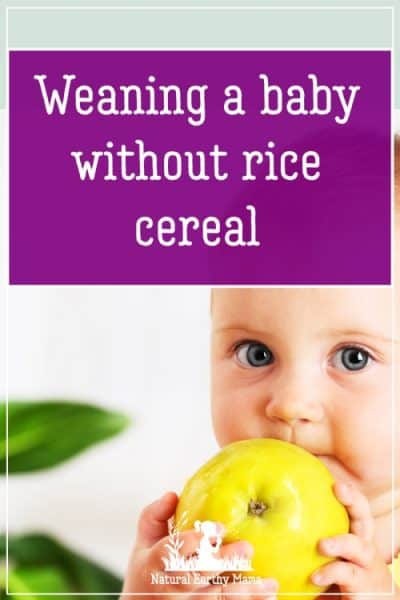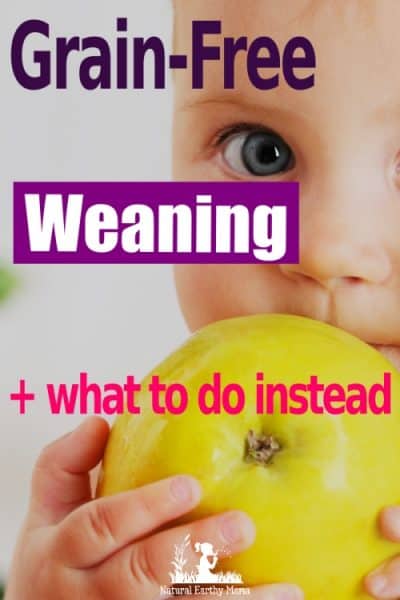 With the rise of baby led weaning, there are more and more babies skipping the rice cereal and going straight to real food. This is GREAT news for your baby.
With the rise of baby led weaning, there are more and more babies skipping the rice cereal and going straight to real food. This is GREAT news for your baby.
Weaning babies without grains is how we used to wean our children on to real food.
Please read: This information is provided for educational purposes only and is not intended to treat, diagnose or prevent any disease. We encourage you to make your own health care decisions in partnership with a qualified health care professional.
This post contains affiliate links, this means at no extra cost to you, we make a commission from sales. Please read
our Disclosure Statement
Baby rice is a very new invention when compared to the age of the human race, it was made as a cheap and convenient (and profitable!) option.
We have been weaning babies without grains for millennia, and for good reasons as it turns out! Here is how I got to the point of grain free weaning with my children:
Our Journey To Grain Free Weaning
My babies have all had different diets right from the start due to me growing and learning as we went.
Our first baby: We were first time parents and I had almost no milk, in fact she was admitted to the hospital at 3 days old severely dehydrated and her jaundice levels were almost off the chart. This meant that she was supplemented with commercial formula from 1 week old.
My second baby: Had both breast and formula right from the start, as I was terrified of starving her. I managed to exclusively breast feed from 4-18 weeks before again drying up and needing to swap to formula again.
I have PCOS and it causes very poor milk supply for me. Read more here.
Number 3 baby: We made our own goat’s milk formula and I used this in a bottle and also managed to breastfeed until he was 15 months. We also weaned him grain free.
We largely try to follow a whole foods / Weston Price / Paleo-esque style diet, which sounds very fancy, but really it is based on real food.
For the most part, our diet is grain free, or at least all the grains that are ingested are soaked or sprouted first.
Did you know that over half what is available to buy in stores these days was not around in our grandparents day?
If my grandparents wouldn’t recognize it as food, we try to avoid eating it.
This leads on to weaning our baby.
Why would whole food, natural eating family then choose to wean baby on ultra processed infant cereal?
Babies are designed to be grain free until they are at least one year of age as we will discuss below.
Grain Free Weaning a Baby
In the article Feeding Babies, Sally Fallon and Mary Enig (both of the Weston A. Price Foundation) wrote,
“Babies produce only small amounts of amylase, needed for the digestion of grains, and are not fully equipped to handle cereals, especially wheat, before the age of one year… Baby’s small intestine mostly produces one enzyme for carbohydrates—lactase, for the digestion of lactose. Many doctors have warned that feeding cereal grains too early can lead to grain allergies later on. Baby’s earliest solid foods should be animal foods as his digestive system, although immature, is better equipped to supply enzymes for digestion of fats and proteins rather than carbohydrates.”
Undigested grains can wreak havoc on your baby’s intestinal lining.
Grains will throw off the balance of bacteria in their gut and can lead to lots of complications as they age including:
- food allergies
- behavioral problems
- mood issues
- autoimmune conditions
and more. Being grain free for the first year or two can help avoid these issues developing in the first place.
The other down side to filling baby’s belly up with foods they can’t digest, is that you are taking up room that could have been filled by nutrient dense and useful foods like vegetables, fats and protein.
These foods have a much higher nutrient content than grains and less chance of an allergic response.
How to wean a baby without grains
Unfortunately, the convenient jar baby food on grocery store shelves doesn’t have anywhere near the nutrients of fresh steamed and pureed food.
But presuming that you also are eating vegetables with your dinner, it is not too difficult to pop a little extra into a pot to steam for baby too?
We do this most nights, keeping a little in a container in the fridge for the next day’s lunch of steamed veggies.
You can freeze small amounts into ice cube trays, and then store in the freezer.
Once baby is eating more I find that a silicon muffin tin is the perfect tool for this job, you can make up individual serves of fish pie or cottage pie etc in these.
Natural First Food Ideas
1. Soft cooked egg yolks
Egg yolks make an amazing first food. Separate the yolk and pop the yolk whole into a pot of simmering water for a couple of minutes and simply mash and serve
A meal packed full of vitamins, fats and protein (egg whites are best avoided until around one year old due to high allergenic potential).
2. Avocado
Avocado is another fantastic first food, with avocado and very ripe banana being a popular combo to either mash together or give in pieces.
3. Steamed Vegetables
Cut sticks of carrot, potato, pumpkin, yam, broccoli, cauliflower and other such things and steam them until they are soft. It is best to do one type at a time as they take different lengths of time to reach that stage.
4. Fruit
Cut large chunks of fruit that they can get a firm grip on, but not put the whole thing in their mouth at once. They will gnaw and suck and get most of the nutrients out this way.
5. Liver
Liver is super high in lots of essential nutrients and a great addition to a baby’s diet.
Either grate frozen liver in to hot vegetable mash, or cook up strips of liver and let baby have a go with them.
One of the arguments people use for rice cereal is that it is fortified with iron. Milk and cereals reduce your ability to absorb iron, so actually vegetables and liver and a much better idea as the vitamin C in the vegetables increases iron absorption.
Puree vs Strips for weaning babies
We did a mixture of pureed veges or fruit along side the idea of Baby Lead Weaning. Baby Lead Weaning states that foods don’t even need to be pureed.
Once your baby is 6 months old (the earliest you should introduce solids anyway), you can just cook vegetables until soft, cut into small pieces and put in front of the baby.
Our little man also enjoyed a little whole milk, full fat yogurt mixed with ripe banana or strawberries, yogurt is full of good probiotics and has a lower level of lactose in it due to the action of the good bacteria.
The more sour the yogurt is, the lower the lactose (milk sugar). Babies have the ability to make lactase, the enzyme needed to digest lactose, most people loose this ability between the ages of 3 and 5, some lucky ducks have the gene that allows them to happily digest milk into adulthood.
Other great first foods are sweet potato, winter squash/pumpkin, carrot, asparagus, eggplant, broccoli, cauliflower, parsnip, swede, spinach, greens, or green beans.
For further reading check out these books:
Please Pin and Share!




